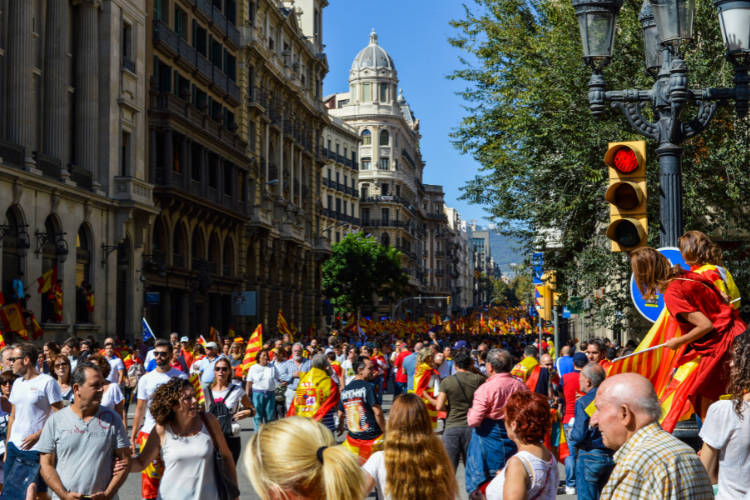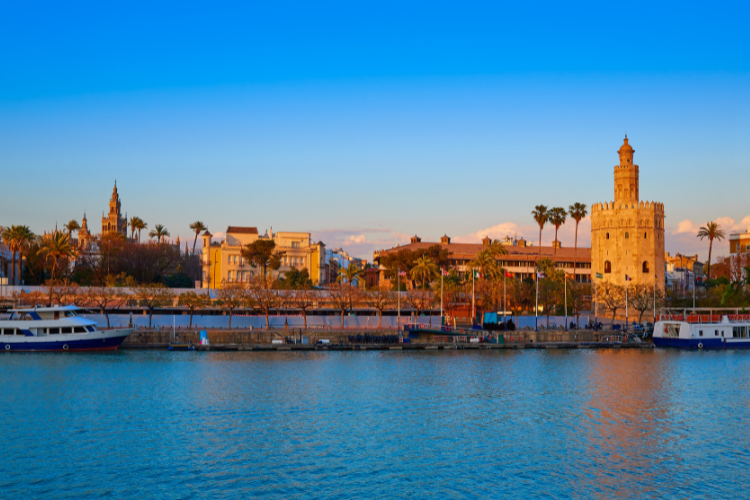Last Updated on November 8, 2024 by Laila Oliveira
If living on the beautiful island of Madeira is on your bucket list, then getting to know the cost of living and other aspects of daily lifestyle is important. So what is the cost of living in Madeira like? How much do you need for your day-to-day living?
Well, to answer these questions, here’s a rundown on some things you should know about living in Madeira and how much money you will need if you decide to relocate here. Tag along!
How expensive is Madeira?
Living in Madeira is not as expensive as you might think. In fact, the cost of living in Madeira is quite cheaper compared to other big cities in Portugal. To get some perspective, the cost of living in Madeira is 12% lower than in Lisbon, the capital of Portugal.
Data from Numbeo further indicates that you will need approximately €2,800 in Madeira to maintain the same standard of life that €3,228 will give you in Lisbon. While Madeira is relatively cheaper, you should realize that the cost of living also depends on your individual spending habits. Let’s have a look at some of the costs of daily essentials when living in Madeira.
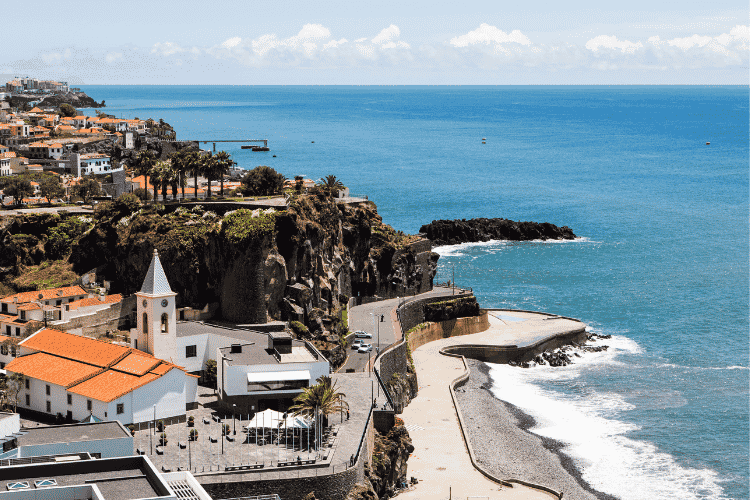
What is the cost of living in Madeira for expats?
Expats relocate to Portugal mostly because of the affordable cost of living for an excellent quality of life. Madeira is no different! We’ll give you an entire rundown of the cost of living in Madeira for expats.
Here’s a table of some basic expenditures you’re likely to incur:
| Expenses | Cost |
|---|---|
| Apartment Rent (one-bedroom) | €450 |
| Apartment Rent (three-bedroom) | €650 |
| Groceries (monthly) | €180 |
| Utilities | €93 |
| Public Transport | €30 |
| Gasoline (per liter) | €2.03 |
| Leisure/Sports | €40 |
House bills
When it comes to service costs, how much you spend depends entirely on your household size and your average lifestyle. For instance, in an 82-square meter apartment in Maderia, you should expect to pay an average of €77.40 for basic utilities like electricity, garbage, and the heating and cooling system.
Furthermore, the cost of a reliable 60 Mbps internet connection should cost you an extra €29.55 every month. Of course, this figure fluctuates depending on the specific location you are living within Madeira.
If you choose to live in a smaller local village, this figure might significantly reduce, allowing you to save extra money for expenses like rent.
Average spending on food
Dining in restaurants in Madeira is quite affordable for many expats. In a mid-range restaurant, a three-course meal enough for two individuals will cost you about €30, according to data from Numbeo. While the cost of a simple meal in a fast food restaurant like McDonald’s should cost you approximately €6.
However, local restaurants owned and managed by local residents can be cheaper than fast food and high-end restaurants. An average meal in such a restaurant will cost you approximately €7.
Portuguese culture is a lot about cooking delicious home-cooked meals and sharing them with a group of friends and family. People here love to cook and spend time with their loved ones over lunch or dinner, and expats have joined in this too.
So, you’ll see a lot of farmer’s markets with fresh produce, like this picture below from Funchal’s market, with very affordable items that can last you a week. This way, grocery shopping becomes much easier and costs you a lot less too.
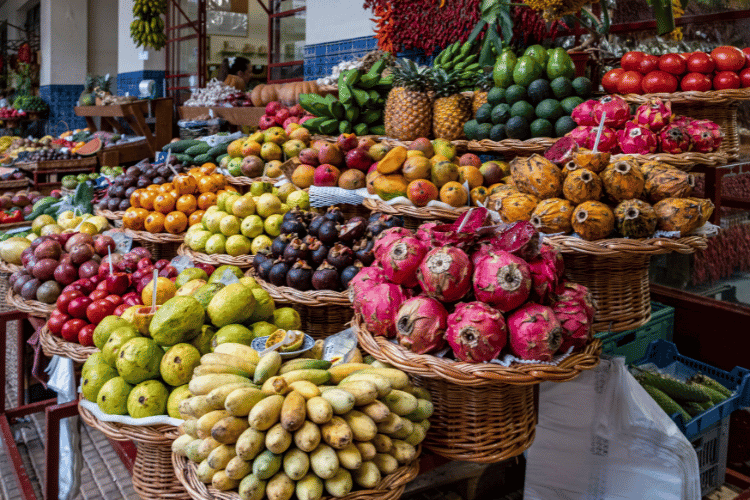
Here are some estimates you should know:
| Expenses | Cost |
|---|---|
| Milk (1 liter) | €0.88 |
| Loaf of Fresh White Bread (500g) | €1.25 |
| Rice (1kg) | €0.97 |
| Eggs (1 dozen) | €1.46 |
| Local Cheese (1kg) | €11.50 |
| Chicken Fillets (1kg) | €5.25 |
| Beef Round (1kg) | €9.50 |
| Apples (1kg) | €1.25 |
| Banana (1kg) | €1.00 |
| Oranges (1kg) | €1.03 |
| Tomato (1kg) | €1.40 |
| Potato (1kg) | €0.80 |
| Onion (1kg) | €1.00 |
| Lettuce (1 head) | €1.05 |
| Water (1.5-liter bottle) | €0.75 |
| Bottle of Wine (Mid-Range) | €4.00 |
| Domestic Beer (0.5-liter bottle) | €1.06 |
| Imported Beer (0.33-liter bottle) | €4.00 |
While in Madeira, be sure to try out the Caldo Verde from a local restaurant. This traditional Portuguese cuisine is a warm, nutritious soup you can enjoy regardless of the weather.
Expected transport cost in Madeira
Moving around in Madeira is quite cheap. The major public transport system is the bus (Horários do Funchal). A pre-paid ticket for Funchal buses costs around €1.35, while a one-day ticket for the same buses will cost you €4.50. Monthly passes for local transport are around €30.
Since the public transport in Madeira works just fine, you don’t need to own a private vehicle; however, if you need to move around the city, you can rent a vehicle. The cheapest car rental company will charge you around €18 per day.
Leisure expenses
There are plenty of leisure and sports activities to do in Madeira; for instance, a monthly subscription to a fitness club costs €43.14 for an adult, while renting a tennis court for 1 hour on a weekend for the entire family costs €19. If you are an avid movie watcher, paying for a single seat in the cinema costs about €6.95, especially for international releases.
When discussing leisure activities, not talking about the expenditure for a night out will be unfair. You don’t need an expensive martini to enjoy your night out in Madeira; there are plenty of local and international brands of beers that are loved and enjoyed by Madeirans.
There are tons of leisure activities you can do apart from the ones we’ve mentioned. Check out our entire guide on Living in Madeira and discover the fun-filled islands!
What are the cheapest areas in Madeira?
First off, the cost of living in Madeira is quite low compared to other cities in Portugal. Therefore, a lot of expats find living in Madeira way cheaper. Here are some top neighborhoods that expats love, according to Pordata.
Ponta do Sol
The village of Ponta do Sol is the warmest place in the entire region. This particular coastal destination is another popular expat hub accounting for around 5% of the entire population. The average cost for a one-bedroom rental apartment is €300 per month.
Porto Moniz
Generally, the cost of living in this small coastal village is quite affordable. It’s home to several lava pools that are the main tourist attraction site in Porto Moniz. The average cost of a one-bedroom rental apartment is €260 per month. The expat population is also quite sizable, accounting for about 4.5% of the population.
Camara de Lobos
Despite being only 9km from the capital and the most expensive municipality, Funchal, this destination is also quite affordable.
This city has a predominantly local population; therefore, knowledge of Portuguese will be necessary if you choose to move here. Foreign presence barely accounts for 1% of the population in Camara de Lobos. The cost of a one-bedroom apartment is €310 per month on average.
What are the most expensive areas in Madeira?
There aren’t many destinations in Madeira that are considered too expensive. However, there are a couple of popular destinations with a relatively higher cost of living than the rest. Here are a few examples.
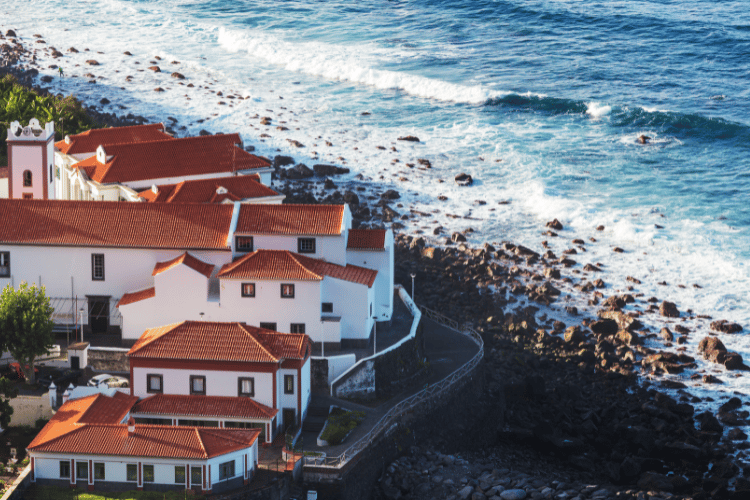
Funchal
This is the capital of Madeira, where every amenity and service is located. Similar to other capital cities in other regions, it doesn’t come as a surprise that Funchal is the most expensive place to live in Madeira.
This city is where the highest purchasing power of Madeira is; therefore, the cost of regular services and products is expected to be high. Funchal has a sizable expat population of about 5.7%. The average cost of renting a one-bedroom apartment is higher than in other places, costing about €450 per month.
Calheta
Calheta is one of the most popular destinations for expats. In fact, the expat population makes up around 8% of the population. It’s not only affordable to live in but is also home to one of the few sandy beaches in Madeira. The average cost of rent is about €400 for a one-bedroom apartment.
Is Madeira more expensive than the Azores islands?
Both Madeira and the Azores are Portuguese archipelagos located in the vast Atlantic ocean. These two destinations are tourist and expat magnets. They are known for their impressive topography and also perfect weather.
While these two destinations might seem similar, they are quite different. The island of Madeira is relatively more developed than the Azores, making it more desirable to visitors.
Compared to the other popular cities in Portugal, Azores and Madeira have a relatively cheaper cost of living.
The question is, between the Azores and Madeira, which destination is more expensive? According to Numbeo, consumer prices in Ponta Delgada, Azores, is 7.27% higher than in Funchal, Madeira (not including rent).
Data from Numbeo further details that the local purchasing power in Funchal is 43% higher than in Ponta Delgada. Generally, the cost of living in the archipelago of Madeira is quite higher than in the Azores. The Azores is a good option if you want a cheaper and less touristy destination to anchor down.
Is Madeira more expensive than Lisbon?
So between the island and the big city, which one is more expensive? Well, while the answer to this question is quite obvious, you should also know that Lisbon doesn’t have the same ilk as other bigger cities around the world.
In fact, you’ll be surprised by how cheaper it is to stay in Lisbon compared to other cities like Paris. Right from the cost of rent to everyday expenses, nothing is extremely unreasonable. On the other hand, Madeira is an island whose main economic driver is tourism activities.
The cost of living in the capital of Portugal is 14% more expensive than the cost of living in Madeira. Data from Numbeo indicates that rent is also 37.63% higher in Lisbon as compared to Funchal, Madeira.
While the cost of living is generally low in Madeira, you should know that the general price of items often increases during the busy summer months when the holidaymakers flock down to the island.
How much do the Portuguese earn in Madeira?
To get an understanding of how much the Portuguese earn on the island of Madeira, it’s essential to understand the labor market. As mentioned earlier, the main economic driver on this island is tourism which also happens to be the major employer.
Thanks to the Golden Visa program, real estate development is rising; therefore, the construction industry is another significant employer in Madeira.
However, the local population is also involved in traditional trades, for instance, fishing and agriculture, which is a major source of living in Madeira.
More recently, Madeira has also become a budding digital nomad paradise with the opening of the Digital Nomad Village in Ponta Do Sol. The monthly average income for the residents in Madeira after tax is around €1,056.
Is it worth the cost of living in Madeira?
Moving to a completely new country is a personal decision that you only make after giving it enough thought. However, it’s worth mentioning that living on an island in the heart of the Atlantic ocean while enjoying the protection of the EU is a dream come true for many people.
The mild climate, slow-paced life, and relatively lower cost of living are among the few things that draw expats from across the globe to this island city.
Madeira is a small island paradise for retirees, digital nomads, and anyone looking to escape the hustle and bustle of busy city life. The islands might be far from the city’s capital or lack the many entertainment and leisure spots, but one thing is for sure, you will be impressed by the magical terrain and peace on the island.
When are you moving to Madeira?
There you have it; this is everything you need to know about the cost of living in Madeira. By now, we hope we have answered many of your questions about living in Madeira and what expenses to expect from this island paradise.
We reckon that moving to a new country can be difficult and sometimes overwhelming, especially if it’s your first time. Consider getting professional assistance from Viv Europe to make your dream come true.
If you’re looking for other expats from Madeira, be sure to join our Facebook Group – All About Portugal For Expats and expand your horizons.




